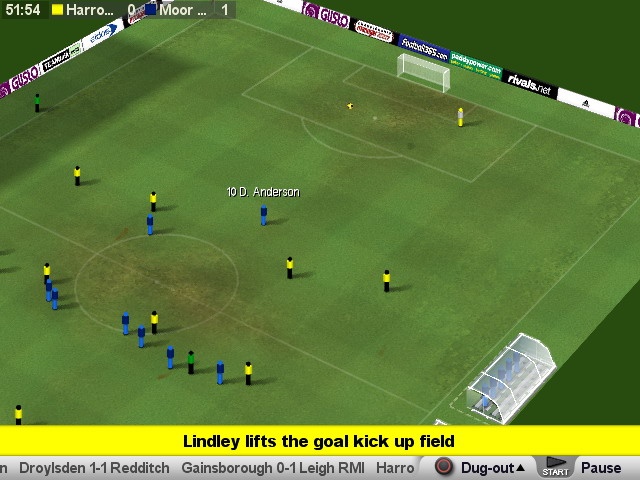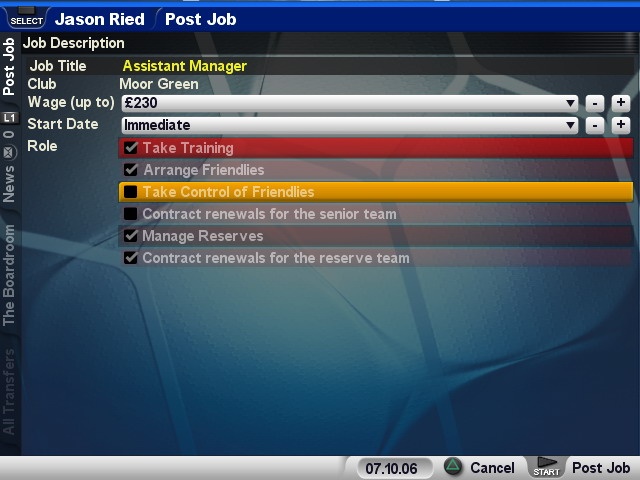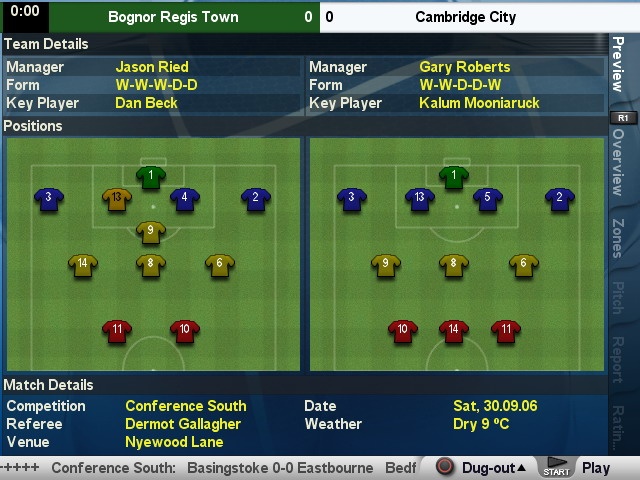The PlayStation 2 probably isn't most people's idea of a perfect platform for a football management game. However, in the past couple of years such games have gained a foothold on the console, and Eidos' Championship Manager 2007 actually does a good job of providing a relatively authentic experience.

Championship Manager 2007 is split into two sections, consisting of the more open-ended traditional CM game, and a set of challenges that require you to fulfil certain objectives in tricky situations--for example, leading Aberdeen to Champions League glory, or getting Crystal Palace promoted to the Premier League. All of your attempts will be rated, and your points tally will be viewable in a chart alongside some world-famous managers of the past.
Before you get to that, however, you'll need to make sure you have enough room on your memory card to save your profile. The file is over 6MB in size due to the amount of information contained in the game, and you can have only one saved game per profile active at any one time. This means you'll need to clear most of a standard Sony memory card, or, unless you have a bigger card, invest in a new one.
Whichever type of game you begin, the interface is the same. There's an awful lot of information to take in with Championship Manager 2007, and so the game is split into a series of screens, each focussing on a specific area of the game. For example, the squad screen lets you look at your players' profiles and assign them positions, while the training screen gives you the opportunity to micromanage the various fitness and technical regimes for each player at any given time in the week.
While these initial screens are cycled through using the L1 and L2 buttons, many have further pages to them, and these are accessed with the R1 and R2 buttons. Often they give you more detailed information on a certain area, so a player's profile, for example, will have one page that details his statistics, another that shows his contract details, another that lists past performances, and so on.
To begin with, this whirlwind of information is pretty overwhelming, but you get used to it within an hour or so. The process is made easier because at any time, while the start button continues the game from any point, you can also view a screen "map" by pressing the select button. That gives you an overview of how the pages are linked, and makes it easy to jump from one body of information to another.
Once you've decided on which team to become the manager of--something which will inform the difficulty level of the game based on board and fan expectations--you've got access to pretty much everything a real-life manager would expect to have. There are masses of teams to choose from, with 26 nations playable, some of which have up to seven league tiers. Once the game has started you can't manage clubs from other nations, but you can move within the divisions you've selected. Inside the game itself you can buy and sell players, work on new tactics and formations, and interact with your squad members on a regular basis. Much can be left to your assistant manager if you'd rather not get your hands too dirty, including contract renewals and the organisation of preseason friendly matches.

As with most games of this kind, you're kept up to date with goings-on in the world around you by the news page, which alerts you to anything noteworthy. This might include injuries to your team members, results of significant matches around the virtual world, transfer bids, or even player unrest. If players are disgruntled about being left out of the side or feel that they're being played out of position, they'll be sure to let you know. You're given the opportunity to respond to them in a variety of ways, ranging from support to criticism, and then the player will let you know their thoughts on that response. It's definitely true to say that you can't keep all of the people happy all of the time, and juggling squad morale in this way can be pretty tricky. However, there will be players that you definitely do not want to annoy, and it pays to do what you can to keep your star performers happy.
All of your hard work, in theory, comes together on match day, and you can choose to "watch" the match or have the artificial intelligence generate a quick result. Either option is viable, although the matches can take up to 10 minutes to get through depending on your preferred speed setting. If you do watch the match you're again presented with a series of screens, each detailing various statistics from the match in progress, as well as a visual representation of the on-pitch action.
Like the PC edition of Championship Manager 2007, the game's not a graphical powerhouse. Mostly this doesn't matter too much, but on match day, although the pitch can be viewed from different angles, the presentation on the whole fails to draw you in. For a sport which relies so much on spectacle, few football management games have succeeded in providing a compelling viewing experience. CM2007 is no different, and the stylistic players and overly large ball adds little to the overall experience.
It's not helped by some dismal crowd sound effects, which will almost certainly result in most people playing the game with the sound muted. Mostly the noise sounds more like a cross between strong winds and moaning zombies than several thousand supporters cheering on their team. Happily, the music which accompanies the many information screens is much better--three chill-out techno tracks which manage not to grow stale over the many hours it takes to play out even a single season of the game. In fact, while the nature of the game means you'll be in it for the long haul, it never takes more than a couple of seconds to process a day's information, which means that getting through the week and on to the matches doesn't feel like hard work.
The single most important aspect of these kinds of games is the extent to which they can provide realistic results while in fact generating an entirely fictional world from a fixed starting point. The further you progress in any football management simulation, the further you will travel from reality, but with CM2007 the game continues to provide robust, believable results well into future seasons. All of the game's data is accurate to January 2007, and while some individuals may have overperformed or underperformed throughout the season, the better teams always tended to float to the top.

One area that does suffer slightly is the transfer market. In preseason, especially, you'll see a lot of slightly odd offers for players tabled--one club bidding for three world-class defenders at once, for example. It's clear after a little while that the AI is hedging its bets, which seems an intelligent move but can be really frustrating. It's especially annoying when teams constantly bid for your players and the transfers subsequently collapse due to a lack of transfer funds, usually because another move has already gone ahead. It's not a showstopper, but it is a weakness that generates some frustration around something that should be an exciting part of the game. There are also no multiplayer options in the game, although football management games on the PlayStation 2 aren't renowned for such functionality, and it's not clear how such options would quite work out, anyway.
That said, overall Championship Manager 2007 is an enjoyable and robust attempt to take a detailed, data-intensive game to an ageing console. It provides an authentic experience relative to the console's capacity, and PlayStation 2 owners who are interested in these kinds of games should give it a try.